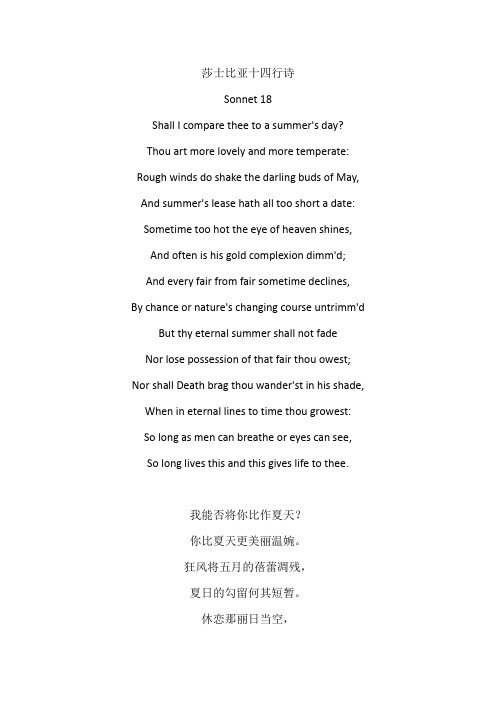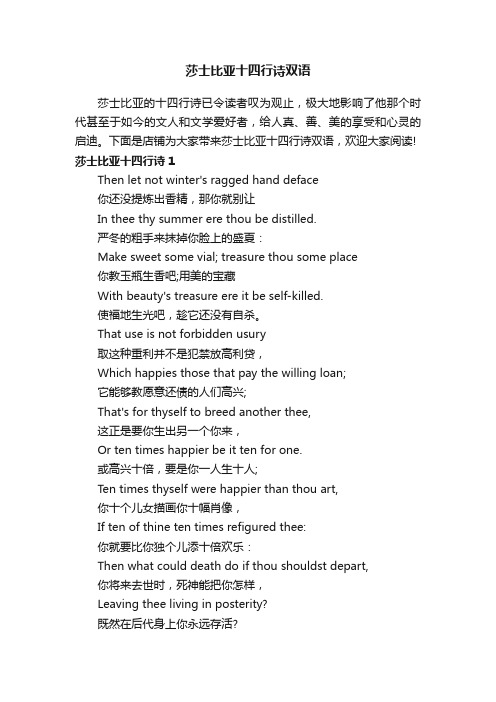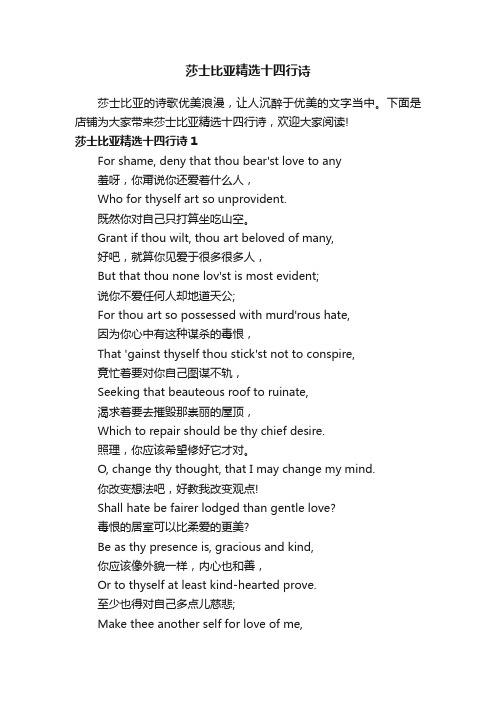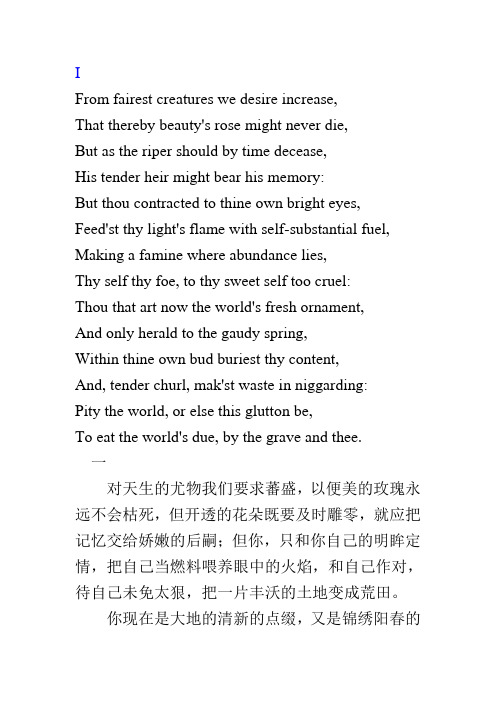莎士比亚十四行诗英文介绍
莎士比亚著名十四行诗鉴赏

莎士比亚著名十四行诗鉴赏莎士比亚是英国文学史上最杰出的戏剧家,也是西方文艺史上最杰出的作家之一,全世界最卓越的文学家之一。
他流传下来的作品包括37部戏剧、155首十四行诗、两首长叙事诗和其他诗歌。
他的戏剧有各种主要语言的译本,且表演次数远远超过其他任何戏剧家的作品。
下面是店铺为大家带来莎士比亚著名十四行诗鉴赏,希望大家喜欢!莎士比亚十四行诗:How sweet and lovely dost thou make the shameWhich, like a canker in the fragrant rose,Doth spot the beauty of thy budding name!O, in what sweets dost thou thy sins enclose!That tongue that tells the story of thy days,Making lascivious comments on thy sport,Cannot dispraise but in a kind of praise;Naming thy name blesses an ill report.O, what a mansion have those vices gotWhich for their habitation chose out thee,Where beauty's veil doth cover every blot,And all things turn to fair that eyes can see!Take heed, dear heart, of this large privilege;The hardest knife ill-used doth lose his edge.耻辱被你弄成多温柔多可爱!恰像馥郁的玫瑰花心的毛虫,它把你含苞欲放的美名污败!哦,多少温馨把你的罪过遮蒙!那讲述你的生平故事的长舌,想对你的娱乐作淫猥的评论,只能用一种赞美口气来贬责:一提起你名字,诬蔑也变谄佞。
莎士比亚十四行诗中英文对照

莎士比亚十四行诗Sonnet 18Shall I compare thee to a summer's day?Thou art more lovely and more temperate: Rough winds do shake the darling buds of May, And summer's lease hath all too short a date: Sometime too hot the eye of heaven shines,And often is his gold complexion dimm'd;And every fair from fair sometime declines, By chance or nature's changing course untrimm'd But thy eternal summer shall not fade Nor lose possession of that fair thou owest; Nor shall Death brag thou wander'st in his shade, When in eternal lines to time thou growest: So long as men can breathe or eyes can see,So long lives this and this gives life to thee.我能否将你比作夏天?你比夏天更美丽温婉。
狂风将五月的蓓蕾凋残,夏日的勾留何其短暂。
休恋那丽日当空,转眼会云雾迷蒙。
休叹那百花飘零,催折于无常的天命。
唯有你永恒的夏日常新,你的美貌亦毫发无损。
死神也无缘将你幽禁,你在我永恒的诗中长存。
只要世间尚有人吟诵我的诗篇,这诗就将不朽,永葆你的芳颜。
When in disgrace with Fortune and men's eyes I all alone beweep my outcast state,And trouble deaf heaven with my bootless cries, And look upon my self and curse my fate, Wishing me like to one more rich in hope, Featured like him, like him with friends possessed, Desiring this man's art, and that man's scope, With what I most enjoy contented least,Yet in these thoughts my self almost despising, Haply I think on thee, and then my state, (Like to the lark at break of day arisingFrom sullen earth) sings hymns at heaven's gate. r thy sweet love remembered such wealth brings, That then I scorn to change my state with kings.当我受尽命运和人们的白眼,暗暗地哀悼自己的身世飘零,徒用呼吁去干扰聋瞶的昊天,顾盼着身影,诅咒自己的生辰,愿我和另一个一样富于希望,面貌相似,又和他一样广交游,希求这人的渊博,那人的内行,最赏心的乐事觉得最不对头;可是,当我正要这样看轻自己,忽然想起了你,于是我的精神,便象云雀破晓从阴霾的大地振翮上升,高唱着圣歌在天门:一想起你的爱使我那么富有,和帝王换位我也不屑于屈就。
[莎士比亚十四行诗18]莎士比亚的十四行诗
![[莎士比亚十四行诗18]莎士比亚的十四行诗](https://img.taocdn.com/s3/m/d6ac01acdc3383c4bb4cf7ec4afe04a1b071b080.png)
[莎士比亚十四行诗18]莎士比亚的十四行诗第一篇莎士比亚的十四行诗:莎士比亚的经典爱情诗第18首十四行诗By William Shakespeare莎士比亚威廉Shall I compare thee to a summer’s dayThou art more lovely and more temperate:能不能让我来把你比作夏日你可是更加可爱,更加温婉;Rough winds do shake the darling buds of May, And summer’s lease hath all too short a date:狂风会吹落五月里盛开的花朵,夏季的日子又未免太短暂;Sometime too hot the eye of heaven shinesAnd often is his gold comple某ion dimmed;有时候苍天的巨眼照得太灼热,他那金彩的脸色也会被遮暗;And every fair from fair sometimes declines, By chance or nature’s changing course untrimmed;每一样美呀,总会(离开美丽)凋落,被时机或者自然的代谢所摧残;But thy eternal summer shall not fade,Nor lose possession of that fair thou own;但是你永久的夏天决不会凋枯,你永远不会失去你美的形象;Nor shall death brag thou wander in his shade,When in eternal lines to time thou grow:死神夸不着你在他影子里的踟蹰,你将在不朽的诗中与时间同长;So long as men can breathe, or eyes can see,So long lives this, and this gives life to thee.只要人类在呼吸,眼睛看得见,我这诗就活着,使你的生命绵延。
十四行诗18英文赏析-莎士比亚

莎士比亚的第18首十四行诗的英文赏析我能否将你比作夏天?你比夏天更美丽温婉。
狂风将五月的蓓蕾凋残,夏日的勾留何其短暂。
休恋那丽日当空,转眼会云雾迷蒙。
休叹那百花飘零,催折于无常的天命。
唯有你永恒的夏日常新,你的美貌亦毫发无损。
死神也无缘将你幽禁,你在我永恒的诗中长存。
只要世间尚有人吟诵我的诗篇,这诗就将不朽,永葆你的芳颜。
这首诗的艺术特点首先是在于它有着双重主题:一是赞美诗人爱友的美貌,二是歌颂了诗歌艺术的不朽力量。
其次就是诗人在诗中运用了新颖的比喻,但又自然而生动。
Sonnet 18, often alternately titled Shall I compare thee to a summer's day?, is one of the best-known of 154 sonnets written by the English playwright and poet William Shakespeare. Part of the Fair Youth sequence (which comprises sonnets 1-126 in the accepted numbering stemming from the first edition in 1609), it is the first of the cycle after the opening sequence now described as the Procreation sonnets. Most scholars now agree that the original subject of the poem, the beloved to whom the poet is writing, is a male, though the poem is commonly used to describe a woman.In the sonnet, the poet compares his beloved to the summer season, and argues that his beloved is better. The poet also states that his beloved will live on forever through the words of the poem. Scholars have found parallels within the poem to Ovid's Tristia and Amores, both of which have love themes. Sonnet 18 is written in the typical Shakespearean sonnet form, having 14 lines of iambic pentameter ending in a rhymed couplet. Detailed exegeses have revealed several double meanings within the poem, giving it a greater depth of interpretation.Sonnet 18 is a typical English or Shakespearean sonnet. It consists of three quatrains followed by a couplet, and has the characteristic rhyme scheme: abab cdcd efef gg. The poem carries the meaning of an Italian or Petrarchan Sonnet. Petrarchan sonnets typically discussed the love and beauty of a beloved, often an unattainable love, but not always.[5] It also contains a volta, or shift in the poem's subject matter, beginning with the third quatrain.A facsimile of the original printing of Sonnet 18.The poem starts with a line of adoration to the beloved—"Shall I compare thee to a summer's day?" The speaker then goes on to say that the beloved being described is both "more lovely and more temperate" than a summer's day. The speaker lists some things that are negative about summer. It is too short—"summer's lease hath alltoo short a date"—and sometimes the sun shines too hot—"Sometime too hot the eye of heaven shines." However, the beloved being described has beauty that will last forever, unlike the fleeting beauty of a summer's day. By putting his love's beauty into the form of poetry, the poet is preserving it forever by the power of his written words. "So long as men can breathe, or eyes can see, So long lives this, and this gives life to thee." The hope is that the two lovers can live on, if not through children, then through the poems brought forth by their love which, unlike children, will not fadeA major feature of this poem - analogy. Begins with the first sentence, put "you" and "Summer" as a analogy, compare the second line of the initial determination: Are you more lovely than the summer, more gentle. The difference is due to produce its in-depth analysis of 3 to 14 lines. Specifically, the first line of 3.4.5.6.7.8 enumerated the "summer" all kinds of regrets, and 9.10.11.12.13.14 line tells the "you" all kinds of advantages compared to the natural draw a final conclusion: "You" is far better than "Summer," "you" because in his poetry between the lines but also has a life, and time forever. Also noteworthy is the verse 13 and 14 are also, by analogy emphasized the "eternal nature."Throughout the poem, the poet freely to the "you" talk, it seems that "you" is a living person, to listen to his voice, understanding his thinking. So this poem can be said to be people in the application of techniques based on the written. The poem "You" refers to an object, academia, there are two explanations, one view is that it refers to beauty, and the other that it refers to poetry to express the good things. Now most scholars prefer the latter.One of the best known of Shakespeare’s sonnets, Sonnet 18 is memorable for the skillful and varied presentation of subject matter, in which the poet’s feelings reach a level of rapture unseen in the previous sonnets. The poet here abandons his quest for the youth to have a child, and instead glories in the youth’s beauty.On the surface, the poem is simply a statement of praise about the beauty of the beloved; summer tends to unpleasant extremes of windiness and heat, but the beloved is always mild and temperate. Summer is incidentally personified as the "eye of heaven" with its "gold complexion"; the imagery throughout is simple and unaffected, with the "darling buds of May" giving way to the "eternal summer", which the speaker promises the beloved. The language, too, is comparatively unadorned for the sonnets; it is not heavy with alliteration or assonance, and nearly every line is its own self-contained clause--almost every line ends with some punctuation, which effects a pause. Initially, the poet poses a question―”Shall I compare thee to a summer’s day?”―and then reflects on it, remarking that the youth’s beauty far surpasses summer’s delights. The imagery is the very essence of simplicity: “wind”and “buds.”In the fourth line, legal terminology―”summer’s lease”―is introduced in contrast to the commonplace images in the first three lines. Note also the poet’s use of extremes in the phrases “more lovely,”“all too short,”and “too hot”; these phrases emphasize the young man’s beauty.Although lines 9 through 12 are marked by a more expansive tone and deeper feeling, the poet returns to the simplicity of the opening images. As one expects in Shakespeare’s sonnets, the proposition that the poet sets up in the first eight lines―that all nature is subject to imperfection―is now contrasted in these next four lines beginning with “But.”Although beauty naturally declines at some point―”And every fair from fair sometime declines”―the youth’s beauty will not; his unchanging appearance is atypical of nature’s steady progression. Even death is impotent against the youth’s beauty. Note the ambiguity in the phrase “eternal lines”: Are these “lines”the poet’s verses or the youth’s hoped-for children? Or are they simply wrinkles meant to represent the process of aging? Whatever the answer, the poet is jubilant in this sonnet because nothing threatens the young man’s beautiful appearance.Sonnet 18 is the first poem in the sonnets not to explicitly encourage the young man to have children. The "procreation" sequence of the first 17 sonnets ended with the speaker's realization that the young man might not need children to preserve his beauty; he could also live, the speaker writes at the end of Sonnet 17, "in my rhyme." Sonnet 18, then, is the first "rhyme"--the speaker's first attempt to preserve the young man's beauty for all time. An important theme of the sonnet (as it is an important theme throughout much of the sequence) is the power of the speaker's poem to defy time and last forever, carrying the beauty of the beloved down to future generations. The beloved's "eternal summer" shall not fade precisely because it is embodied in the sonnet: "So long as men can breathe or eyes can see," the speaker writes in the couplet, "So long lives this, and this gives life to thee."大多数莎学家认为,是作者赞美好友的超常之美的。
莎士比亚十四行诗双语

莎士比亚十四行诗双语莎士比亚的十四行诗已令读者叹为观止,极大地影响了他那个时代甚至于如今的文人和文学爱好者,给人真、善、美的享受和心灵的启迪。
下面是店铺为大家带来莎士比亚十四行诗双语,欢迎大家阅读! 莎士比亚十四行诗1Then let not winter's ragged hand deface你还没提炼出香精,那你就别让In thee thy summer ere thou be distilled.严冬的粗手来抹掉你脸上的盛夏:Make sweet some vial; treasure thou some place你教玉瓶生香吧;用美的宝藏With beauty's treasure ere it be self-killed.使福地生光吧,趁它还没有自杀。
That use is not forbidden usury取这种重利并不是犯禁放高利贷,Which happies those that pay the willing loan;它能够教愿意还债的人们高兴;That's for thyself to breed another thee,这正是要你生出另一个你来,Or ten times happier be it ten for one.或高兴十倍,要是你一人生十人;Ten times thyself were happier than thou art,你十个儿女描画你十幅肖像,If ten of thine ten times refigured thee:你就要比你独个儿添十倍欢乐:Then what could death do if thou shouldst depart,你将来去世时,死神能把你怎样,Leaving thee living in posterity?既然在后代身上你永远存活?Be not self-willed, for thou art much too fair,别刚愎自用,你太美丽了,不应该To be death's conquest and make worms thine heir.让死神掳去、教蛆虫做你的后代。
莎士比亚著名十四行诗

莎士比亚著名十四行诗莎士比亚是英国文学史上最杰出的戏剧家,也是西方文艺史上最杰出的作家之一,全世界最卓越的文学家之一。
他流传下来的作品包括37部戏剧、155首十四行诗、两首长叙事诗和其他诗歌。
他的戏剧有各种主要语言的译本,且表演次数远远超过其他任何戏剧家的作品。
下面是店铺为大家带来莎士比亚著名十四行诗,希望大家喜欢!莎士比亚著名十四行诗:Were 't aught to me I bore the canopy,With my extern the outward honouring,Or laid great bases for eternity,Which prove more short than waste or ruining?Have I not seen dwellers on form and favourLose all, and more, by paying too much rent,For compound sweet forgoing simple savour,Pitiful thrivers, in their gazing spent?No, let me be obsequious in thy heart,And take thou my oblation, poor but free,Which is not mix'd with seconds, knows no art,But mutual render, only me for thee.Hence, thou suborn'd informer! a true soulWhen most impeach'd stands least in thy control.这对我何益,纵使我高擎华盖,用我的外表来为你妆点门面,或奠下伟大基础,要留芳万代,其实比荒凉和毁灭为期更短?难道我没见过拘守仪表的人,付出高昂的代价,却丧失一切,厌弃淡泊而拚命去追求荤辛,可怜的赢利者,在顾盼中雕谢?不,请让我在你心里长保忠贞,收下这份菲薄但由衷的献礼,它不搀杂次品,也不包藏机心,而只是你我间互相致送诚意。
莎士比亚精选十四行诗

莎士比亚精选十四行诗莎士比亚的诗歌优美浪漫,让人沉醉于优美的文字当中。
下面是店铺为大家带来莎士比亚精选十四行诗,欢迎大家阅读!莎士比亚精选十四行诗1For shame, deny that thou bear'st love to any羞呀,你甭说你还爱着什么人,Who for thyself art so unprovident.既然你对自己只打算坐吃山空。
Grant if thou wilt, thou art beloved of many,好吧,就算你见爱于很多很多人,But that thou none lov'st is most evident;说你不爱任何人却地道天公;For thou art so possessed with murd'rous hate,因为你心中有这种谋杀的毒恨,That 'gainst thyself thou stick'st not to conspire,竟忙着要对你自己图谋不轨,Seeking that beauteous roof to ruinate,渴求着要去摧毁那崇丽的屋顶,Which to repair should be thy chief desire.照理,你应该希望修好它才对。
O, change thy thought, that I may change my mind.你改变想法吧,好教我改变观点!Shall hate be fairer lodged than gentle love?毒恨的居室可以比柔爱的更美?Be as thy presence is, gracious and kind,你应该像外貌一样,内心也和善,Or to thyself at least kind-hearted prove.至少也得对自己多点儿慈悲;Make thee another self for love of me,你爱我,就该去做另一个自身,That beauty still may live in thine or thee.使美在你或你后代身上永存。
莎士比亚十四行诗英文版

IFrom fairest creatures we desire increase,That thereby beauty's rose might never die,But as the riper should by time decease,His tender heir might bear his memory:But thou contracted to thine own bright eyes,Feed'st thy light's flame with self-substantial fuel, Making a famine where abundance lies,Thy self thy foe, to thy sweet self too cruel:Thou that art now the world's fresh ornament,And only herald to the gaudy spring,Within thine own bud buriest thy content,And, tender churl, mak'st waste in niggarding:Pity the world, or else this glutton be,To eat the world's due, by the grave and thee.一对天生的尤物我们要求蕃盛,以便美的玫瑰永远不会枯死,但开透的花朵既要及时雕零,就应把记忆交给娇嫩的后嗣;但你,只和你自己的明眸定情,把自己当燃料喂养眼中的火焰,和自己作对,待自己未免太狠,把一片丰沃的土地变成荒田。
你现在是大地的清新的点缀,又是锦绣阳春的唯一的前锋,为什么把富源葬送在嫩蕊里,温柔的鄙夫,要吝啬,反而浪用?可怜这个世界吧,要不然,贪夫,就吞噬世界的份,由你和坟墓。
- 1、下载文档前请自行甄别文档内容的完整性,平台不提供额外的编辑、内容补充、找答案等附加服务。
- 2、"仅部分预览"的文档,不可在线预览部分如存在完整性等问题,可反馈申请退款(可完整预览的文档不适用该条件!)。
- 3、如文档侵犯您的权益,请联系客服反馈,我们会尽快为您处理(人工客服工作时间:9:00-18:30)。
In the first two quatrains, the speaker presents various images to illustrate the devastating effects of time. Time is passing so quickly and no one can stop it. In front of time, everything will unavoidably decay and lose its brilliance at last. This sense of time passing is reinforced by the poet through the use of alliteration in the first line of the sonnet
12
When I do count the clock that tells the time,
And see the brave day sunk in hideous night;
当我数着壁上报时的自鸣钟, 见the violet past prime, And sable curls all silver'd o'er with white
• 第一部分为三个四行, • 第二部分为两行,每行十个音节, 韵脚为:abab,cdcd,efef,gg
10
诗的结构越严谨就越难抒情, 而莎士比亚的十四行诗却毫不拘谨,自由奔放, 正如他的剧作天马行空, 其诗歌的语言也富于想象,感情充沛。
11
Love procreation
Death Time & Immortality
Plays
Histories Comedy
Masterpiece
long poem Sonnets
Tragedy
Tragicomedy
Sonnets
• 十四行诗是源于意大利民间 的一种抒情短诗
• 文艺复兴初期时盛行于整个欧洲 • 结构严谨,分为上下两部分
• 莎士比亚的十四行诗的结构却更严谨—— 他将十四个诗行分为两部分:
children.
THANKS FOR WACHING
Shakespeare's sonnet 12 addresses to a young man who is beautiful but self-loving. In this sonnet, the speaker reflects on the destructive effects of time upon all natural objects as well as the youth and beauty of human beings. He recommends that one can be immortal by means of marriage and children.
夏天的青翠一束一束地就缚, 带着坚挺的白须被舁上殓床;
Then of thy beauty do I question make, That thou among the wastes of time must go,
于是我不禁为你的朱颜焦虑: 终有天你要加入时光的废堆,
Since sweets and beauties do themselves forsake, And die as fast as they see others grow;
quatrains 四行诗 illustrate 阐明 devastate 彻底破坏 decay 腐朽 reinforce 加强 alliteration 头韵
. The consonant sound [K] repeated in the words "count" and "clock" suggests the unstoppable ticking of the clock’ measuring out man's life span with an impersonal but inexorable regularity, and thus deepens the fear of the addressee to the passage of time and to the loss of his beauty and life. The change of color in nature is another way to illustrate the time passing and implies the cruelty of time.
Who ?
The most influential writer
Born in 1564 to a successful middle-class
Had never went to university
Passed away in 1616
The tomb of Shakespeare
Shakespeare’s Birthplace
当我凝望着紫罗兰老了春容, 青丝的卷发遍洒着皑皑白雪;
When lofty trees I see barren of leaves,
Which erst from heat did canopy the herd,
当我看见参天的树枝叶尽脱, 它不久前曾荫蔽喘息的牛羊;
And summer's green, all girded up in sheaves, Born on the bier with white and bristly beard;
violet 紫罗兰 wither 干枯 curl 鬈发 sable 紫貂 bier 停尸架 bristly 粗硬的
• summarize
Every living thing will
die
.
the
only
way of gaining immortality
is by means of creating
consonant 辅音 ticking 钟表走时 inexorable 无法改变的 addressee 收件人
In line 2 "Brave day”, which struggles against the forces of darkness’ inevitably fades with the sinking of the sun. The bright daylight becomes dark night. The brilliantly-colored violet will lose its beauty and wither once it passes its best time. Similarly, the black curls of the young people will certainly lose its "sable" color and turns first to "silver", then to a lifeless "white ".”Green" corps in summer will turn to "the bier with white and bristly beard" in winter.
既然美和芳菲都把自己抛弃, 眼看着别人生长自己却枯萎;
And nothing 'gainst Time's scythe can make defence
Save breed, to brave him when he takes thee hence.
没什么抵挡得住时光的毒手 , 除了生育,当他来要把你拘走。
